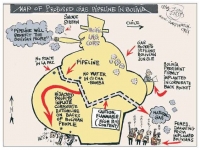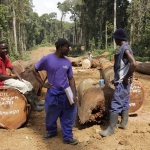Bolivian President Falls Over Gas Sale to California

COCHABAMBA -- Bolivia has once again experienced a major political and social crisis, this time ending in the forced departure of its president, Gonzalo Sanchez de Lozada. Since mid-September, a wave of protest has spread across the country demanding government action on a variety of issues but the key spark was opposition to a proposed mega-deal by a private consortium known as Pacific LNG to sell Bolivian natural gas to California.
More than 70 people have been killed in clashes with the government near the capital city of La Paz. These clashes escalated as the government sent soldiers and tanks into the streets in an attempt to break-up blockades of the highways. President Sanchez de Lozada announced a suspension of the deal until the end of the year, but it was not enough to satisfy social movements opposed to the deal and skeptical of the government.
War Over Gas
At the heart of Bolivia's current wave of protest is a proposed deal to export a portion of the country's mammoth natural gas reserves to California. Pacific LNG is seeking a deal to ship the gas out of land-locked Bolivia through its Pacific coast neighbor, Chile.
That proposal runs smack into a deep, century-old, national resentment over Chile's seizure of Bolivia's last remaining access to the sea in 1879. School children here are still taught that the nation must reclaim its ocean.
Even if the gas were piped to the Pacific some way other than Chile, polls say a majority of Bolivians would still oppose the gas deal with California. The International Monetary Fund (IMF) and others claim that the sale would be a cash boon for a country that really could use one. But average Bolivians aren't buying the argument that those benefits will ever trickle down to them.
"The money will all just end up in the pockets of the President, the ministers and other politicians, says Lourdes Netz, a former Roman Catholic nun. "Look at all the public companies that have been privatized. Have the people benefited?"
Under the terms of the agreement with the Bolivian government, Pacific LNG would invest $5 billion to build the project while the Bolivian government would receive royalties of 18%. Critics argue that under these terms the impoverished country would find itself on the losing end, despite the current high price of natural gas. Bolivia deregulated its economy in the mid-1990s, under the auspices of the IMF and an earlier tenure of Sanchez de Lozada. These reforms cut the royalties that the government would receive from half to less than one fifth of the revenues from gas sales.
Bolivia's political system is also notoriously corrupt Transparency International rates it among the most dishonest in Latin America. When local corruption meets big international conglomerates looking for a way to pipe away natural resources at rock-bottom prices, the result is usually a sweetheart deal that leaves the dealmakers happy and the public left in the dust.
Many people here say that its essential to first get a political system that will actually sell the gas in the people's interests, before the gas is sold.
Destination: California
Pacific LNG, the consortium behind the project, is composed of the British multinationals BG Group and Pan-American Energy itself composed of BP and Bridas and the Spanish giant Repsol-YPF. The $5 billion gas export plan consists of a 700km pipeline from Bolivia to a port in Chile from where gas would be shipped to Mexico. There the shipment would be converted from its liquefied form back into a gas by the American company Sempra Energy Corp. and imported in California via a pipeline running from Baja California.
The San Diego-based Sempra has been in negotiations since December of 2001 with Pacific LNG for a 20-year contract amounting to $7 billion. Sempra has been criticized for gouging consumers during the California energy crisis by inflating the price of gas and still faces investigation by federal and state regulators. It has been rushing to build gas terminals in the US and Mexico in response to the high price of natural gas while opposition to its projects mounts from groups like Greenpeace Mexico.
BP, Repsol-YPF and the BG Group have similarly unsavory records. BP, formerly known as British Petroleum, has been accused by the European Parliament for complicity in human rights abuses by the military in Colombia, and has been involved in environmentally damaging projects all over the world.
Similarly Repsol-YPF has built destructive pipelines in the Ecuadorian Amazon and on indigenous land in Colombia, both in conjunction with Shell and Occidental Petroleum, and independently on the land of the Uwa people. In 2002, the Mapuche people in Argentina sued the Spanish oil conglomerate for $404 million over the irreversible damage of indigenous lands.
The current Bolivian gas pipeline is not the first for the BG Group. BG was involved in a Bolivia to Brazil gas pipeline through the Amazon that was partially financed by loans from the World Bank and Inter-American Development Bank. According to geographer Derrick Hindery, the project was constructed in spite of the saturation of the energy market in Brazil. It led to increased exploration, forest clearing and settlement along the pipeline perimeter, which includes delicate rainforest ecosystems and the lands of Guaran, Chiquitano, and Ayoreo indigenous communities.
Although the Bolivia-Chile pipeline is suspended for now, BGs Petrina Fahey says that they are optimistic about the future nonetheless. BG believes that Bolivia's gas reserves are key to the country's future prosperity and our aim is to continue to work with the government to deliver gas projects which support the best interests of the people of Bolivia.
Fahey adds that Pacific LNGs actions are not culpable for the upheaval. The current unrest in Bolivia is a political matter, and it would therefore be inappropriate for BG to pass comment. The situation is regrettable and BG hopes that a peaceful solution will be achieved shortly.
In Bechtels Footsteps
Bolivia's "gas war" bears many similarities to the now-famous deal three years ago in which the California-based engineering giant, Bechtel, was given control of the water system of Bolivia's third largest city, Cochabamba. Within weeks of taking control of the city's water, Bechtel hit poor families with huge increases in their water bills, enough to spark a popular rebellion and chase Bechtel out of the country.
In their closed-door negotiations with the Bolivian government, Bechtel officials were no doubt given reassurance that the government could handle any protests that might erupt. To defend Bechtel's contract the Bolivian government imposed a state of martial law and fired live rounds at its own people. Yet not even that was enough to make Bechtel's Bolivian deal stick.
Pacific LNG seems intent to follow in Bechtel's footsteps, having tanks sent out in their favor even before the first pipe is laid in the ground. However, the corporations eager to be the multi-billion dollar gas link between Bolivia and California might want to reflect a bit on whether they want to really follow Bechtel's lead. However clear the words may be on paper, an agreement with the Bolivian government on gas won't mean very much if it faces widespread public opposition.
Tip of a Larger Iceberg
One of the best ways to understand Bolivia is to think of South Africa in the last days of apartheid in the early 1990s. In Bolivia the vast majority is unbelievably poor, mostly Indian, and struggles for basic survival. The country is run, however, both politically and economically, by a tiny, wealthy elite that seems mostly intent on protecting its privileges. One Bolivia lives in adobe houses without running water. The other vacations at Disney World.
This conflict erupts periodically in violent clashes as labor groups, coca farmers, teachers, university students and other sectors take to the streets to protest government policies. Bolivia's last serious eruption
of protest, which left 33 people dead, was in February, over the government's implementation of an IMF-pressured economic belt-tightening package.
The pattern repeats itself over and over again. Social movements make demands and the government ignores them. Those movements then take to the streets and the government sends in police and soldiers. Eventually people get killed and the Catholic Church persuades the government and movement leaders to sit down for talks. The government makes a series of promises, which it then breaks, and the cycle begins once more.
While Bolivia's social movements enjoy broad public support for their demands - a fair deal or no deal on gas, opposition to privatization, etc. - the non-protesting majority is growing weary of their tactics. As the old saying goes, "When you have a hammer everything looks like a nail." In Bolivia, every protest seems to turn into highway blockades and other disruptions that hurt the poor more than anyone else. Unfortunately, it seems that massive disruption is the only language that Bolivian political leaders can hear.
If Pacific LNG follows Bechtel's path - watching on CNN as Bolivia falls into bloody chaos on its behalf - its dreams of a California gas deal will also fall into chaos and its public reputation, deservedly, will pay a heavy toll. Instead, it should tell the Bolivian government to put away its tanks and tell the Bolivian people that it wants to make a deal worthy of broad public support. Bolivia's new President, former Vice-President
Carlos Mesa, vowed to support a binding public referendum on the gas deal the night he took office.
Support for a revising the deal has also come from key California consumer groups. "We can't solve our energy problems by purchasing gas that has been in effect robbed from other countries," said Nettie Hoge, executive director of The Utility Reform Network, California's largest utility consumers' advocacy organization. "Pacific LNG has the power to demand that the Bolivian government stop shooting at protestors and the power to negotiate a fairer gas deal for the Bolivian people. They should do both as soon as possible."
Jim Shultz is executive director of the Bolivia-based Democracy Center.



